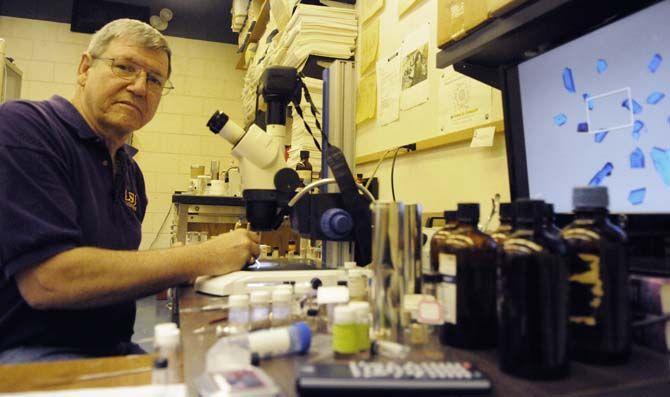Though students and faculty often proclaim their love of purple and gold, research associate Frank Fronczek’s extensive work at the University makes his dedication crystal clear.
Fronczek, who has worked for the University’s chemistry department for almost 40 years, specializes in crystallography — the method scientists use to identify compounds by using X-rays to look at the molecular structure of a crystal.
He also runs the department’s X-ray facility, and his expertise has become a valuable tool for research teams around the world.
“We can calculate the densities of all the atoms in a molecule and we come up with a mathematical model, which we can display on a computer screen or maybe build a physical model out of plastic balls,” Fronczek said. “This allows us to use crystallography as a supermicroscope to see what the individual molecule in the crystal looks like, as well as identify the elements that make up that molecule.”
Fronczek co-authored a third of the department’s recent science journal entries.
Chemistry professor Graça Vicente considers Fronczek an asset in her research developing molecules for medicinal and biological applications.
“Based on the structure provided by [Fronczek] we can redesign other molecules that are more effective in the applications we want to use them for,” Vicente said. “It’s always wonderful for a scientist to work with another that just loves the science. [Fronczek], not only gives us the beautiful structure of molecules but also determines the direction the research goes.”
Outside of the University, Fronczek has collaborated with scientists at other Louisiana institutions like the University of New Orleans and the University of Louisiana at Lafayette. He also has worked with researchers in other parts of the U.S., India and Turkey by analyzing samples in the X-ray laboratory.
“When we wrote the proposal to buy [X-ray facility instruments], we told the Board of Regents that we wanted to provide this service for the University, as well as for other institutions,” Fronczek said. “We offer our expertise and the instruments to provide this service to as many institutions as we can in order to prove this lab is money well spent.”
As Louisiana legislators discuss the budget for the upcoming academic year, Fronczek said substantial cuts to higher education funding could have an effect on research projects done by the University.
“I think it is very unlikely that [the University will] fire [Fronczek]” said Andrew Maverick, acting associate dean in the College of Science. “What might happen, however, is that we might give up the service contract we have to keep the machines in the X-ray lab functional, which would be a huge gamble.”
The service contract ensures the repair of the instruments in the X-ray lab when they are in need of maintenance.
Cutting the service contract would save money in the short term, but would have long-term consequences, as the repairs could become more expensive and keep the lab out of commission for long periods of time, Maverick said.
“We have definitely weathered some budgetary disasters and crises like these in past years,” Fronczek said. “However, it keeps happening, and it seems like every time it gets worse, which is not good for research.”
Fronczek graduated the University with a bachelor’s degree in chemistry in 1970. He earned a Ph.D in chemistry with a specialty in crystallography at the California Institute of Technology and did his postdoctoral research in Berkeley, California, before accepting what was supposed to be a one-year teaching position at the University in 1976.
“I’ve learned a lot from him over the years,” Maverick said. “What a lot of people don’t know is that a lot of the faculty aren’t experts in some areas like crystallography. Having someone like [Fronczek] at the University to share his expertise, not only with students but with professors, as well as having the resources to teach students how to use this equipment keeps [the University] in people’s minds.”
Although Fronczek could retire whenever he pleases, he is not planning on giving up his lab or his work for many years to come.
“I never left [the University; I] had an offer or two, but I bleed purple and gold and this is home. I’m very happy with the work I do here,” Fronczek said.
University researcher specializes in crystallography
January 27, 2015




